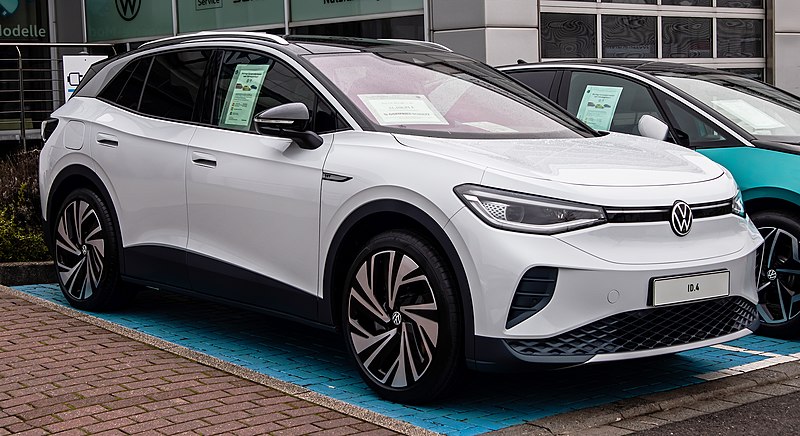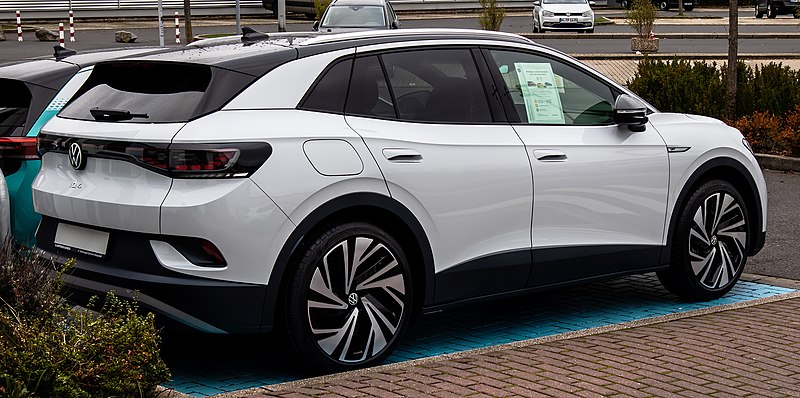
Volkswagen’s ID4 is another crucial car for the company. As motoring journalists start to post their reviews, we ask whether the electric SUV stacks up for a mass market.
Volkswagen’s Big Gamble — Again
When it comes to electric cars, no one can accuse Volkswagen of being over-cautious. As other manufacturers dither with massively expensive, low-volume offerings (we’re looking at you, Honda!), the German giant has boldly embraced an electric future, aiming to produce the first electron-driven vehicles with a truly broad appeal.
As we’ve noted before, thats a massive gamble. It’s not so much whether the electric car will take over from fossil fuels — that’s looking increasingly certain — but a question of when to catch the wave. If Volkswagen are too early, then the wait-and-see manufacturers stand to gain. They can continue to churn out hugely popular fossil fuel models, letting Volkswagen take all of the risks. Later, they can swoop down on a fully mature market like vultures on a battlefield. Of course, Volkswagen’s rivals have the opposite risk: they may arrive on the scene too late, after VW has already gained a major advantage.
How this all turns out depends on lots of things outside manufacturers’ controls, like government policies and infrastructure. But it also comes down to producing compelling products which people want to own.
Enter the ID4
Volkswagen’s ID3 was its first attempt for mass electric appeal, targeting the huge european hatchback market. The early signs are good, but to really get traction, Volkswagen will need to crack the SUV conundrum.
The SUV market is, to put it mildly, huge. Global sales are projected to reach 53.2 million units in 2027, up from 26.8 million in 2017. SUVs are eating away at the sales of other vehicle types, even European hatchbacks. Unless SUVs suffer a reversal in fortune, all big manufacturers need to compete in this sector or face withering away. For that reason, the ID4 could be Volkswagen’s ticket to continued growth, or an incredibly expensive false step.
So, will enough people buy it? If the ID4 has the basics of price and practicality right, they may. Let’s take a look.
Is the ID4 cheap enough for a mass market?
In the UK, with the government incentive, the ID4 First Edition will set you back £37,800. That’s a comparatively high-spec model. Car Magazine anticipates that entry level ID Life could be around £31,ooo, rising to over £50K for whistles-and-bells versions.
The fairest fossil-fuel comparison would be the Volkswagen Tiguan, which ranges from £25,460 to £37,400. The big question is whether buyers will be prepared to spend an ‘electric premium’ of at least £5,000.
We think that they might. Prospective owners may well factor in the lower running costs and maintenance for the ID4, which level the playing field between the two options. The other attractions of going electric — escaping emission charges, lowering environmental footprint, reduced cabin noise and so on — may be persuasive. Past history can be a guide too: in the case of the Tesla Model 3, droves of buyers were willing to pay more in order to get the advantages (and cachet) of an electric saloon.
How practical is the ID4?

To be successful, the ID4 has to be a car that one can live with on a day-to-day basis. So what does an electric SUV need to do really well? There are four essentials:
- It’s got to be a convenient size, neither too big nor too cramped.
- It must have enough storage for shopping or suitcases, with fold-down seats for runs to the tip.
- The cabin needs to be well-organised, with reasonable creature comforts.
- For longer trips, recharging mustn’t be too frequent or too long-winded.
It’s no surprise that the ID4 has the first three covered. After all, Volkswagen is the master at producing supremely practical cars, and an electric drivetrain does nothing to change that.
Size-wise, the ID4 is a tad bigger than the popular Tiguan, and offers a bit more boot space — 543 litres compared to 520. That expands to 1655 litres with the seats down, which is plenty for most purposes.
Driving Electric comments that the ID4 has “the feel is of a well-built and nicely designed cabin… It’s practical too – the lack of a centre tunnel in the back means there’s lots of space for feet, while the rear bench sits higher up to offer a cinematic view forwards with lots of head and legroom.”
As for creature comforts, we will cover the infotainment and driving aids in Part Two of this article, but for now it suffices to say that the ID4 has exactly what might be expected for a modern SUV at this price point.
That leaves the recharging issue. And actually, we think that for most people, it’s going to be a non-issue.
According to the official figures, the entry level ID4 is good for 213 miles, rising to 323 miles for the 77kWH variant. Choose the 125kW charging option, and you can add 199 miles in 30 minutes. Fair enough, in the real world you’re not going to achieve those mileages, and you may be struggling to find a super-duper charging station. But as we are in the real world, how often do we travel that far without a break? At an average of 50mph, 200 miles means four hours in the car, by which time everyone is overdue for the loo, and parents with small kids will need a sanity break.
So, although the ID4 might be a pain if you’re driving down to San Tropez, it will do just fine for most longer trips. The range is also comparable to established electric rivals like the Hyundai Kona.
The X, Y and Z factors
Of course, there have been plenty of practical, reasonably priced cars that have completely failed to sell. Car buying isn’t just a rational decision, and even an SUV has to capture the buyer’s imagination. In Part Two of this article, we’ll be looking at the ID4’s X, Y and Z factors, and give it an overall thumbs up or thumbs down. Stay tuned!
The WVS blog covers a wide range of automotive topics, from the contentious to the light-hearted. We are an independent garage specialising in all the VW group marques, including Audi, Volkswagen, Skoda and SEAT. WVS provides services, repairs and MOTs, delivering a main dealer level of care at affordable prices. To book your vehicle in, or for any enquiries, get in touch.

